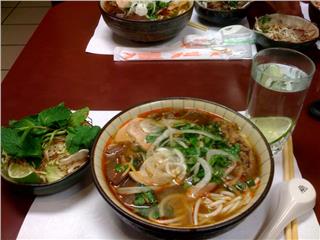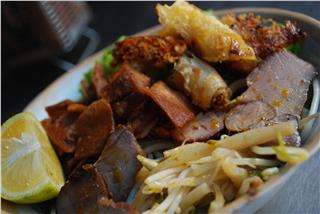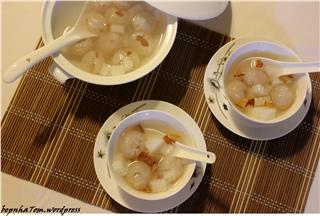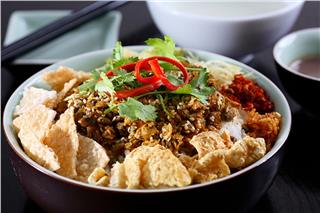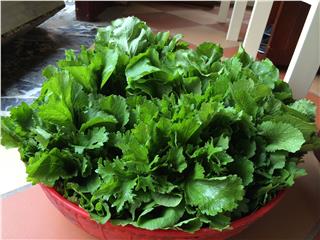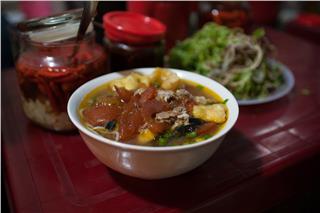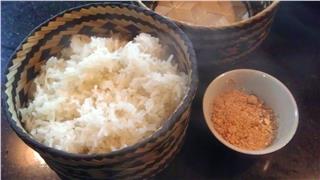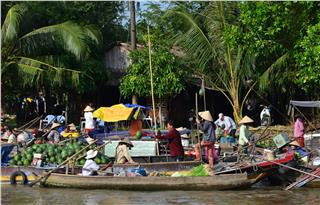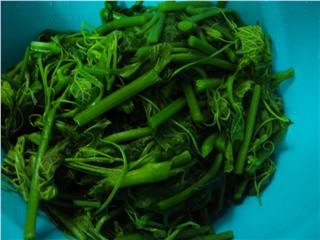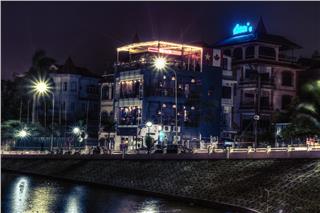Delicious sweetened porridge dishes in Hue cuisine
Fri, 09 Jan 2015 . Last updated Thu, 25 Jun 2015 08:58
-
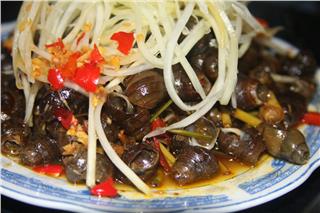 Tasty snail dishes in Vietnamese cuisine 6860 viewed
Tasty snail dishes in Vietnamese cuisine 6860 viewed -
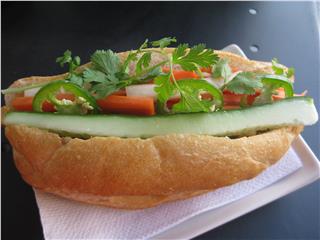 Taste of Banh Mi in Vietnam cuisine 6215 viewed
Taste of Banh Mi in Vietnam cuisine 6215 viewed -
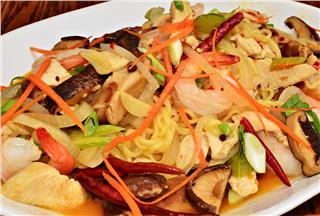 Delicious Vietnamese mushroom dishes 5839 viewed
Delicious Vietnamese mushroom dishes 5839 viewed -
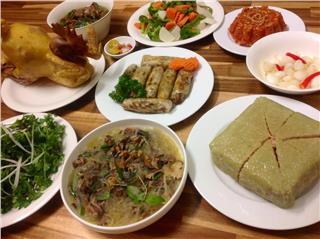 Traditional Vietnamese Tet food 5730 viewed
Traditional Vietnamese Tet food 5730 viewed -
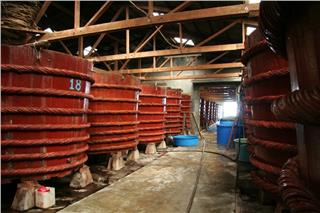 Phu Quoc fish sauce 5546 viewed
Phu Quoc fish sauce 5546 viewed -
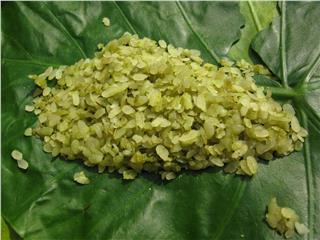 Com Vong special dish of autumn in Hanoi cuisine 5527 viewed
Com Vong special dish of autumn in Hanoi cuisine 5527 viewed -
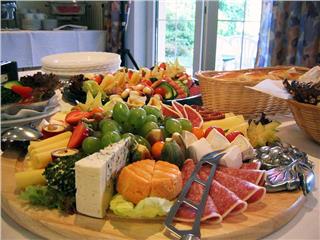 German food culture in Hanoi 5149 viewed
German food culture in Hanoi 5149 viewed -
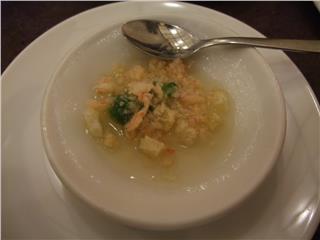 Assorted cakes in Hue cuisine 5029 viewed
Assorted cakes in Hue cuisine 5029 viewed -
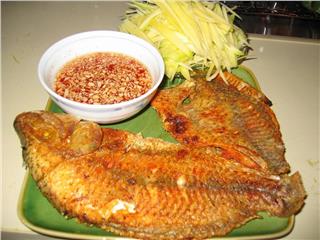 Delicious Vietnamese fish dishes 5001 viewed
Delicious Vietnamese fish dishes 5001 viewed
Hue people are very meticulous in making and enjoying dishes, even simple dishes like sweetened porridge. When visiting this city, tourists should not miss the chance to taste the delicious sweetened porridge of Hue cuisine.
Hue, a dreamy city by the Huong River, holds an appeal to tourists thanks to the ancient beauty of moss-covered buildings. Visiting Hue, tourists are enchanted by its cuisine which is seen as the most diverse food treasure in Vietnam. This ancient capital is the rendezvous of the country’s quintessence. Hue’s cuisine is the nice blend of foods from different parts of countries. However Hue dishes have distinctive taste. The dishes reflect customs, practices, the art of making and garnishing food of Hue people. Its long history and in-depth culture make Hue cuisine special with specialties well-known throughout the country and the world.
According to researchers, Hue sweetened porridge has long been made in Phu Xuan. It is the nice blend of the art of cooking of Cham people and traditional dishes of Vietnamese people, which brings typical tastes to Hue dishes. They are saltiness, sweetness, sourness, piquancy and bitterness. Hue people are so delicate and picky. That’s why they have created many sweetened porridge dishes that hold an appeal to diners. There are elegant but elaborately made sweetened porridge dishes like lotus seed sweetened porridge, lotus seed wrapped in longan sweetened porridge, roasted pork wrapped in tapioca starch sweetened porridge and mung bean pudding.
At the same time, there are plain sweetened porridge dishes like corn sweetened porridge, floating cake in sweetened porridge, hyacinth bean sweetened porridge, tapioca starch sweetened porridge, green bean sweetened porridge, mixed sweetened porridge and taro sweetened porridge. When the night falls, sweetened porridge stalls by the dreamy Huong River and under the Trang Tien Bridge stir up the atmosphere. In the hot weather, nothing is as great as enjoying the fresh breeze by the Huong River, watching people moving to and trying a bowl of Hue sweetened porridge. So interesting!
There are many good sweetened porridge stalls in Hue. Cung Dinh Hue (Hue Royal Palace) stall at No.31 Nguyen Hue Street is a typical example. This is an ideal place to enjoy genuine Hue sweetened porridge dishes in an old space. The sweetened porridge here enchants not only the locals but also tourists. Trying a bowl of Hue sweetened porridge, diners will definitely find it so great to enjoy the fragrance, the butteriness and sweetness of the dish.
Perhaps the roasted pork wrapped in tapioca starch sweetened porridge cannot be found anywhere else. The name of the dish alone makes diners curious and urges them to try it immediately. It is said that Mo Ton Dich stall on Dinh Tien Hoang Street is the most famous stall selling the dish. The mild sweetness of rock sugar, the tasty toughness and the greasiness of roasted pork will definitely grip diners. Hue sweetened porridge is love by not only Hue natives, but also tourists everywhere. Once you try Hue sweetened porridge, never could you forget its lasting taste.
Fertile sediments of the Huong River bring special taste to corn ears on the Hen Islet. From these corns ears, Hue people can make the corn sweetened porridge, the steamed sticky rice with corn, grilled corn and boiled corn. Plain tasty dishes have left a strong impression on diners. Sticky corn has long been seen as a valuable ingredient of Hue. These corn ears have small size and do not hold many kernels. Yet they stand out with eye-catching yellow color, sweet taste, fragrance and glutinosity. After finding corn on the Hen Islet for the corn sweetened porridge, I follow Mrs. Ton Dich to the Dong Ba Market to look for the ingredients of her family’s traditional dish of sweetened porridge.
First opened in 1899 under the reign of King Thanh Thai, the Dong Ba market has become a cultural tourism site in Hue. Tourists to the market can take a closer look at the local way of life, at the same time try many specialties of Hue which are brought here by traders. Roasted pork neck is the best for the dish. He dishes are special because it’s not difficult to find their ingredients. Pork can become an ingredient for the sweetened porridge recipe. The greasiness of pork is showed off cleverly. It explains why the dish surprises diners a lot.
It takes the cook skillfulness to slice the kernels. Hue sweetened porridge dishes stand out with distinctive flavor. Their mild sweetness is created by typical ingredients and the skillfulness of Hue women. Only corn grown on the Hen Islet can brig distinctive taste to the famous dish of corn sweetened porridge of Hue. Corn grown in other places cannot. This is the secret of making the dish. It seems to be easy to make the dish. However, it takes much experience and skillfulness to make the tasty corn sweetened porridge.
The cook spends 2-3 hours to complete the dish of the best taste. The kernels of young corn ears are sliced before being put into the pot containing corncob cooking water. The sliced kernels are cooked well. According to Mrs. Ton Dich, we have to stir the mixture steadily for an hour till the kernels are done well, then add refined sugar into the mixture and continue stirring. A medium amount of sugar is added to bring the mild sweetness to the dish. So, the corn sweetened porridge is done. It can be served hot or with some ice cubes and coconut milk. You can definitely feel the wonderful taste of corn grown on the Hen Islet.
It takes the cook much time, effort and patience to prepare ingredients, spices and complete a sweetened porridge dish. Hue people enjoy the sweetened porridge all year round. They take warm sweetened porridge in winter to warm themselves up. An abundance of sweetened porridge dishes served with ice cubes are available in summer. It explains why Hue sweetened porridge has become an indispensable part of Hue people’s life and taken up a decent position in the Hue cuisine.
The simmered roasted pork smells so good that it could whet our appetite. But it’s enough to show us how delicate Hue people’s way of enjoying food. It takes the cook cleverness to wrap pork cubes in tapioca starch. These roasted pork dumplings are made in the same size. A roasted pork cube is wrapped neatly in a thin layer of tapioca starch. This step must be carried out carefully. A little chink on the tapioca wrap alone may spoil the tastiness of roasted pork inside. As said by Mrs.Ton Dich, now I know Hue people not only consider cooking as an art, but also infuse their different feelings into their dishes in an effort to add more colors to the local cuisine which they have preserved and handed down from generation to generation.
Now we have roasted pork dumplings. Put them into the boiling pot and boil them for 10 minutes till the tapioca wrap is done well. Remove the dumplings from the pot to another pot containing sugar syrup. The syrups are made from refined sugar, pandanus and vanilla, which will perfect the dish.
Source: VTC10 - NETVIET

